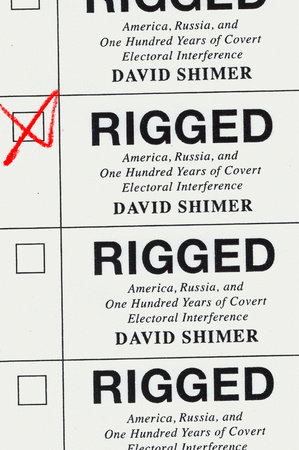
Rigged by David Shimer presents a historical account and comprehensive analysis of how American and Russian covert electoral interference has changed over the last three decades. American operations have transformed from covert operations to public aid through non-profit organizations. Russians, however, remain committed to covert strategies – using tactics like cyber-hacking, trolling, and developing “fake news” posts on popular social media platforms, as reported by Luke Harding in a book review for the Guardian. To prepare for the book, David Shimer interviewed over 130 officials, from a former KGB general to eight previous CIA directors, and scoured archives across six countries.
Shimer defines “covert electoral interference” by three elements:
- Covert – “non-attributable,” e.g. “the hand of the actor is hidden,”
- Electoral – “targeting a democratic vote of succession,” e.g., casting ballots for a candidate, and
- Interference – “deploying active measures” to achieve the result.
Accordingly, in Rigged, “covert electoral interference” identifies “a concealed foreign effort to manipulate a democratic vote of succession.”
Rigged highlights American and Russian covert electoral interference operations worldwide
Shimer explains the origin of American and Russian interference in elections of third countries culminated during the Cold War. Their reasons were obvious: Americans wanted to keep the communist Russians out; Russians wanted them in. In 1947, for the first time, the CIA acted to ensure the success of pro-democratic leaders. The first operation took place in Italy, where the CIA supplied the Christian Democratic party with money, had Italian Americans write letters home, and worked closely with the Church. Three years later, the CIA conducted similar operations in Guatemala, Iran. The KGB simultaneously directed money to communist-friendly leaders in Latin America and African nations. Alternately, Russian electoral interference began in 1919, twenty-nine years before the United States’ operations, as Shimer explained to CBS.Russia first tried interfering in American elections in the 1960s and 70s, targeting Richard Nixon and Ronald Reagan. Those attempts failed. In Rigged, Shimer highlights Russian interference in the 1960, 1968, 1976, 1984, and 2016 elections.
Rigged reveals additional details about Russian interference in 2016 US presidential election
President Obama knew there was undeniable evidence showing Russia was interfering in the 2016 election but did nothing to stop it. Whereas many believe voting tallies were not affected, some, like Harry Reid, say there is no doubt Russian interference included vote tampering.
In Rigged, Shimer argues that Putin succeeded where all other Russian leaders had failed – he has successfully divided American society and placed a Russian-friendly leader in the White House. One goal of Rigged is to dispel the myth that the 2016 election was a new phenomenon. It wasn’t. Russia’s interference in the 2016 election was a continuation of its tried and true covert operations through exploiting new technologies. Social media platforms enabled Russia to use its disruptive tactic with ease.
Shimer is certain of one thing: Russia influenced the minds of over 100 million American voters leading up to the 2016 presidential election.
Russia is targeting American minds
According to Shimer, Russia seeks to delegitimize the American presidential election by casting doubt on the fairness of the result. The goal is to undermine the American democratic system, not necessarily support one candidate over another. During the CBS interview, Shimer reminded us: “Because what Putin's after here, is chaos, is dysfunction, is corrupting democracies. Trump is a means to that end. But there are other ways of achieving it, one of which is just making Americans wonder whether their election was fair at all.”
In Rigged, Shimer argues Putin’s chief goal is to change the landscape of American politics – to elect leaders who will degrade American democracy and remove Americans’ faith in the electoral process – something we need to resist.
-written by Allison Hedrick